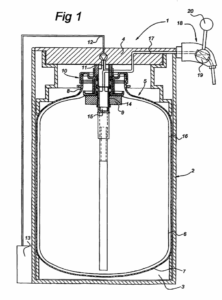On September 5, 2018, Heineken filed a complaint with the International Trade Commission against Anheuser-Busch alleging a violation of § 337 of the Tariff Act, in the importation into or sale in the United States of beverage dispensing systems and components that allegedly infringed claims 1–11 of Heineken U.S. Patent No. 7,188,751 (the “’751 patent”). Heineken later dismissed several claims, leaving allegations related to claims 1, 3, 7, and 10 of the patent.

On September 5, 2019, the ALJ issued a final initial determination, finding by a preponderance of the evidence that the remaining claims were infringed and not invalid, and thereby finding a violation of § 337 with respect to those claims.[1] The ALJ recommended that should the Commission find a violation of § 337, that the Commission issue a limited exclusion order, a cease and desist order, and impose a bond.
Both parties filed petitions for review of the initial determination. On November 4, 2019, the Commission determined to review the initial determination in its entirety.
After briefing, the Commission ultimately agreed with the ALJ and Heineken, finding that Heineken demonstrated the existence of a domestic industry and that the asserted claims of the ’751 patent were infringed and not invalid. The Commission issued a limited exclusion order prohibiting the entry of infringing systems and a cease and desist order, supporting its decision by citing that the public interest factors did not preclude an exclusion order (considering “public health and welfare, competitive conditions in the United States economy, the production of like or directly competitive articles in the United States, and United States consumers” per 19 U.S.C. § 1337(d) and (f)).

The ITC is a valuable resource available to competitors seeking to prevent others in their industries from making infringing use of valuable technology. ITC proceedings are streamlined and resolve issues far faster than proceedings in federal court.
